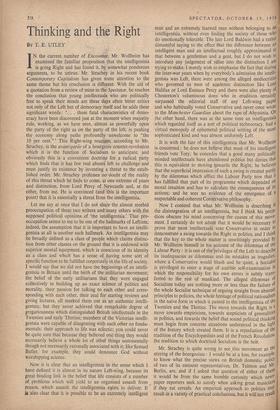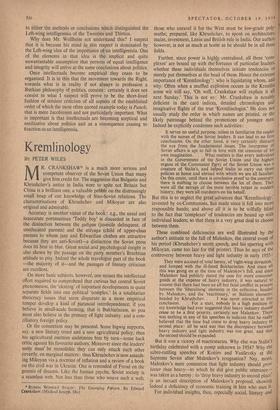Thinking and the Right
BY T. E. UTLEY IN the current number of Encounter, Mr. Wollheim has examined the familiar proposition that the intelligentsia is going Right and has found it, by somewhat ponderous arguments, to be untrue. Mr. Strachey in his recent book Contemporary Capitalism has given some attention to the same theme but his conclusion is different. With the aid of a quotation from a review of mine in the Spectator, he reaches the conclusion that young intellectuals who are politically free to speak their minds are these days often bitter critics not only of the Left but of democracy itself and he adds these significant words : '. . . these fatal characteristics of demo- cracy have been discovered just at the moment when majority rule, working, as we have seen, almost as powerfully upon the party of the right as on the party of the left, is pushing the economy along paths profoundly unwelcome to "the 10 per cent."' This Right-wing reaction, according to Mr. Strachey, is the avant-garde of a bourgeois counter-revolution which it is the function of Socialism to anticipate. and obviously this 'is a convenient doctrine for. a radical party which finds that it has few real abuses left to challenge and must justify its existence by inventing a threat to the estab- lished order. Mr. Strachey professes no doubt of the reality of this threat which he finds to come, at one extreme of years and distinction, from Lord Percy of Newcastle and, at the other, from me. He is convinced (and this is the important point) that it is essentially a threat from the intelligentsia.
Let me say at once that I do not share the almost morbid preoccupation of these two wtiters and many others with the supposed political opinions of 'the intelligentsia.' That pre- occupation seems to me to be one of the hallmarks of Leftism; indeed, the assumption that it is important to have an intelli- gentsia at all is another such hallmark. An intelligentsia may be broadly defined as a class of people which claims distinc- tion from other classes on the ground that it is endowed with superior mental equipment, which is conscious of its identity as a class and which has a sense of having some sort of specific function to be fulfilled corporately in the life of society. I would say that we did not have the beginnings of an intelli- gentsia in Britain until the birth of the utilitarian movement; the belief of the early utilitarians that they were engaged collectively in building up an exact science of politics and morality, their passion for talking to each other and corre- sponding with each other, their zeal for starting reviews and giving lectures, all marked them out as an authentic intelli- gentsia; but they never achieved that remarkable degree of gregariousness which distinguished British intellectuals in the Twenties and early Thirties; members of the Victorian intelli- gentsia were capable of disagreeing with each other on funda- mentals; their approach to life was eclectic; you, could never be quite sure that because they believed one thing they would necessarily believe a whole lot of other things sentimentally, though not necessarily rationally associated with it; like Samuel Butler, for example, they could denounce God without worshipping science. - Now it is clear that an intelligentsia in the sense which 1 have defined it is almost in its nature Left-wing, because its great binding link is the belief that life consists of a number pf problems which will yield to an organised assault from reason, which assault the intelligentsia efists to deliver. It iff also clear that it is possible to be an extremely intelligent man and an extremely learned man without belonging to an intelligentsia, without even finding the society of those who do emotionally tolerable. The late Lord Baldwin had a rather distasteful saying to the effect that the difference between an intelligent man and an intellectual roughly approximated to that between a gentleman and a gent, but I do not wish to introduce any judgement of value into the distinction I alll trying to Make. I merely wish to emphasise the fact that during the inter-war years when by everybody's admission the intelli- gentsia was Left, there were among the alleged mediocrities who governed us men of aoademic distinction like Lord Halifax or Lord Eustace Percy and there were also plenty of Chesterton's voluminous dons who in erudition certainly surpassed the editorial staff Of any Left-wing paper and who habitually voted Conservative and never once wrote to the Manchester Guardian about the rape of Abyssinia. On the other hand, there was at the same time an intelligentsia which regarded itself as a sort of political technocracy. had a virtual monopoly of ephemeral political writing of the more sophisticated kind and was almost uniformly Left.
It is with the fate of this intelligentsia that Mr. Wollheim is concerned : he does not believe that most of his intelligent friends vote Tory; he concedes that a good many politically minded intellectuals have abandoned politics but denies that this is equivalent to moving towards the Right; he believes that the superficial impression of such a swing is created partly by the dilemmas which afflict the Labour Party now that it has fulfilled that part of its programme which depended on moral intuition and has to calculate the consequences of its actions; and he sees no evidence of the emergence of II respectable and coherent Conservative philosophy.
Now I contend that what Mr. Wollheim is describing IS the disintegration of an intelligentsia, but I think his preia' dices obscure his mind concerning the causes of this move' ment. I certainly do not admit that it would be necessary to prove that most intellectuals vote Conservative in order to demonstrate a swing towards the Right in politics, and I think that the key to the whole matter is unwittingly provided by Mr. Wollheim himself in his account of the dilemmas of the Labour Party : it is one of the privileges of the Left to describe its inadequacies as dilemmas and, its mistakes as tragedies' where a Conservative would blush and be quiet, a Socialist is privileged to enter a stage of audible self-examination in which the responsibility for his own errors is subtly trans: ferred to the rest of mankind. The alleged dilemmas of Socialism today are nothing more or less than the failure of the whole Socialist technique of arguing straight from abstract principles to policies, the whole heritage of political rationali0 in the naive form in which it passed to the intelligentsia of the Twenties and the Thirties. The move towards the Right is move towards empiricism, towards scepticism of generalities in politics, and towards the belief that sound political thinking must begin from concrete situations understood in the light of the history which created them. It is a repudiation of the tradition of the Encyclopmdists and of the French Revolution. the tradition to which doctrinal Socialism is the heir.
Mr. Strachey is quite wrong to see,this movement as the stirring of the bourgeoisie : I would be at a loss, for example. to know what the precise .views on British domestic policy of two of its eminent representatives, Dr. Talmon and Mr. Berlin, are, and if I asked that question of either of thern it would be from the same humble curiosity which nevi's" paper reporters seek to satisfy when asking great musicians if they eat cereals. An empirical approach to politics ma?' result in a variety of practical conclusions, but it will not result in either the methods or conclusions which distinguished the Left-wing intelligentsia of the Twenties and Thirties.
Why does Mr. Wollheim not understand this? I suspect that it is because his mind in this respect is dominated by the Left-wing idea of the importance of an intelligentsia. One of the elements in that idea is the implicit and quite unwarrantable assumption that persons of equal intelligence and integrity will arrive at the same conclusions about politics.
Once intellectuals become empirical they cease to be organised. It is in this that the movement towards the Right, towards what is in reality if not always in profession a Burkian philosophy of politics, consists: certainly it does not consist in what I suspect will prove to be the short-lived fashion of strident criticism of all aspects of the established order of which the most often quoted example today is Punch; that is mere Jacobinism and not particularly important. What is important is that intellectuals are becoming sceptical and meditative about politics and as a consequence ceasing to function as an intelligentsia.



































 Previous page
Previous page